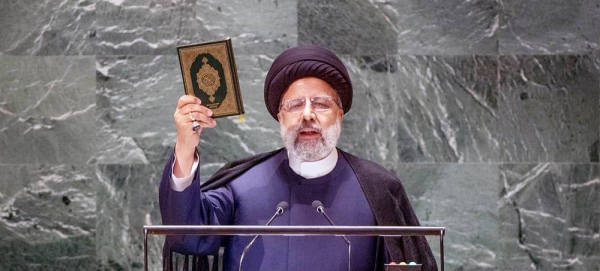
A delegation from the UK Parliament this week visited Saudi Aramco’s Abqaiq oil processing facility, which was struck by a large number of drones and missiles in an attack on Sept. 14. Their photos and accounts of the visit show just how precise the strikes were: In a facility that includes large areas of open space, the targets were carefully chosen. Some were hit multiple times. Countering the claim by Yemen’s Houthis that they were responsible, the damage shows the attack came from the north.
As the Saudi government has said (backed up by comments from the UK prime minister on Monday), all the signs point to this being an Iranian attack. If so, it marks new heights in the escalation Iran has pursued in the past year: From shooting down an American drone to planting limpet mines on tankers, both in port and at sea, to the seizure of UK-flagged shipping.
This escalation has gone largely unanswered, except by sanctions. And yet, bizarrely, many in the West — people who know about the world, and upon whom politicians rely for support — seem to think that there is Western (and Saudi) culpability in what is happening. I have had multiple conversations with people that include phrases like “it takes two to tango.” They point to past Western interference in Iran, such as the overthrow of Mohammed Mossadegh in 1953; the attempted rescue of the US Embassy hostages launched by President Jimmy Carter; the support for Iraq in the Iran-Iraq War; interference in Iran’s “backyard” with the occupation of Iraq and support for the rebels in Syria; support for Israel against Hezbollah; or, most recently, the US withdrawal from the Iran nuclear deal. The list can go on and on.
The funny thing about such arguments is how one-sided they are, and how increasingly difficult that becomes to sustain the closer we get to the present day. It seems incredible to say, but the Mossadegh coup was 66 years ago. Many of those in positions of power in the West today were not even alive then, and none were actively involved in government. Every other example that is given follows the Iranian revolution: A revolution that, not only in its words but also in its actions, opposed not only Western involvement in the Middle East, but seemingly the very idea of the democratic West itself.
This is not to say that every decision Western powers (and here we are largely talking about the US) have taken regarding Iran has been wise. Far from it: In retrospect, many actions taken on Iran have been foolish and laced with hubris. But the antagonism felt in the US and many other capitals toward Iran is not for its own sake but because, every time an olive branch is offered, Iran escalates.
Without getting into the merits or otherwise of President Barack Obama and Secretary of State John Kerry’s Iran deal, it was an effort by the US to develop a mutually beneficial relationship and welcome Iran back into the rules-governed global order. The response was Iran using the income generated by its opening economy not to better the lives of its citizens, but to pour resources into exacerbating civil wars and unrest in Iraq, Syria and Lebanon.
Iran follows a tactic beloved of those who oppose the global order — Russia and China (it is no coincidence that Iran, Russia and China have just announced joint military exercises) — that of incremental advance toward one’s goals. Break the rules a little bit: If there is no response, or none that breaches what can be sustained, then break them a little more. Before long, that country’s rule-breaking is the new normal, and so it escalates, like a drug user moving from softer to harder and harder drugs, seeking the purity of that first high.
In this rule-breaking, Iran is encouraged by swaths of Western public and political opinion, most prominently on the left. A survey published in the UK this week to mark the opposition Labour Party’s annual conference reports that 40 percent of party members think that Daesh and the UK are equally to blame for terror attacks on the UK; another 30 percent believe that the blame lies mostly with Britain. More members blamed Britain for the terror attacks committed by the Irish Republican Army than blamed the IRA themselves. It is these attitudes that lead Jeremy Corbyn to stand with Hezbollah and Hamas and call them his “friends.” And I can guarantee you that, if the survey had asked a question about Iran and the recent strikes on the Aramco refineries, the majority would have said that the West and Saudi Arabia were mostly to blame.
Why should Iran worry about escalating the situation in the Gulf, attacking its neighbors or boosting terrorist groups when it knows that the Western commitment to supporting its allies in the Middle East is so fragile? When it sees such ambivalence, why should it believe that Western threats of action are to be taken seriously?
It isn’t the West that suffers most from the consequence of this ambivalence, but its allies here in this region. And, despite many of the same people believing that the West’s allies must share some of the blame for what happens to them, simply by virtue of being allies of the West, they are actually at risk because they refuse to bow to a power as nakedly aggressive and acquisitive as any that Europe has produced.
Iran is no longer dominated by the ideology of the Islamic revolution, any more than the Soviet Union was by communism in the end. But revolutionary ideology can get it what it wants: Using passionate believers as its proxies elsewhere. It must be resisted, and there is no place for ambivalence in the West.
Peter Welby is a consultant on religion and global affairs, specializing in the Arab world. Previously, he was the managing editor of a think tank on religious extremism, the Center on Religion & Geopolitics, and worked in public affairs in the Gulf. He is based in London and has lived in Egypt and Yemen. Twitter: @pdcwelby












